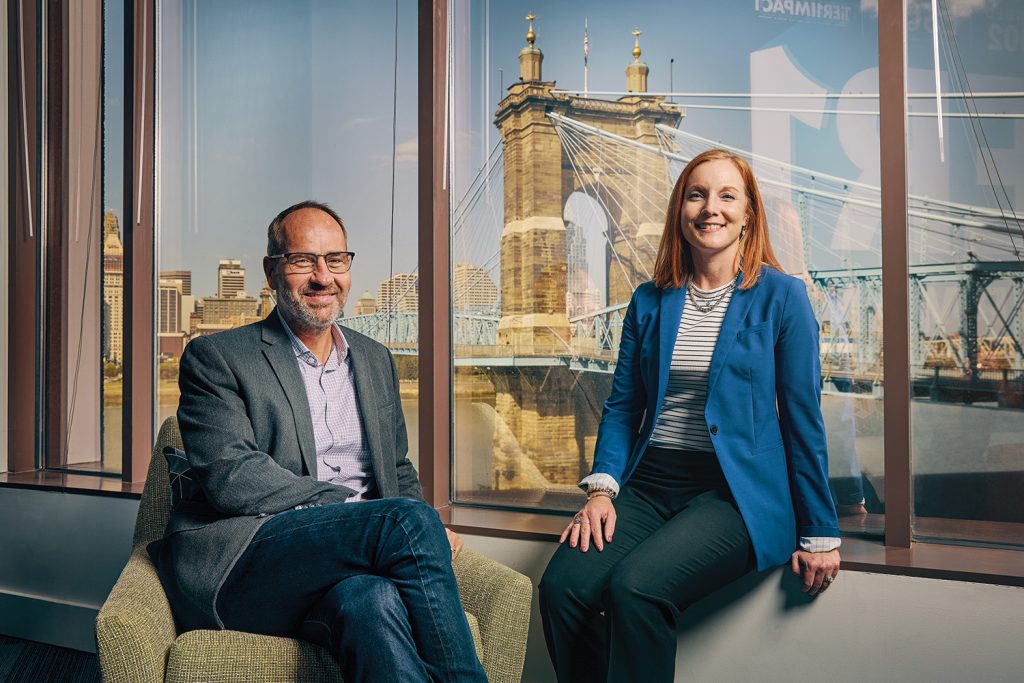In a world increasingly focused on productivity and bottom lines, the mental health of employees and their loved ones has emerged as a critical concern in the workplace. Businesses continue to grapple with the challenges of a post-pandemic landscape, and the need for accessible and effective mental health support has never been more urgent.
According to the Community Health Status Survey from Interact for Health in 2022, as many as 17 percent of individuals in the Cincinnati region reported frequent mental distress, which is defined as experiencing 14 or more mentally unhealthy days in a month. The survey also illuminated disparities among vulnerable populations: LGBTQ+ individuals reported the highest rates of distress at 42 percent, followed by those living in poverty (31 percent), young adults (25 percent), and rural residents (23 percent).
To address these pressing challenges, Interact for Health, under the leadership of public health advocate Kate Schroder, is monitoring and measuring mental health challenges for people of all ages, as well as developing additional awareness and support programs.
Tier1 Performance, the Covington-based consulting firm, is one of the leading private businesses that’s embraced transparency and support for employees’ mental health. The company’s Start the Conversation program launched with a survey that revealed 94 percent of its workforce said they or one of their loved ones struggled with mental health; two-thirds of program participants reported later that they spoke with someone about mental health for the first time thanks to information presented in the program. Today Tier1 offers its employee program to other companies at no cost.
[Illustration at top by Heedayah Lockman]

Schroder is a Cincinnati native and ran as a candidate for Congress in Ohio’s 1st District in 2020. Her platform included expanding access to affordable health care and economic mobility, and her experiences before and after underscore her expertise in health fields.
While working at The Health Collaborative, Schroder oversaw a regional effort to address disparities in vaccination rates. As vice president at the Clinton Health Access Initiative, she helped reduce drug prices and increased the number of children receiving proper medical treatment in India, Kenya, Nigeria, and Uganda.
Now president and CEO of Interact for Health, she’s aligned her health equity experience with the nonprofit organization’s mission that every person deserves the opportunity to live his or her healthiest life. That includes combating economic injustice, systemic racism, and other experiences by vulnerable populations.
The Interact for Health team went through a strategic planning process a year and a half ago, conducting more than 100 one-on-one conversations to hear the needs and issues faced by individuals in the community. Schroder says that mental health was a recurring theme in those discussions. In response, the organization launched a youth mental health initiative in partnership with other funders and community partners.
“One silver lining to the pandemic is that people are much more comfortable talking about mental health now and it’s becoming much more of a mainstream topic,” says Schroder. “This is especially the case with youth. They’re leading us in this space by talking about their feelings and their mental health every day. Some generations have grown up with more shame around mental health, and that’s just not the case with our younger generations.”
She’s encouraged that young people are breaking down these barriers to talk about mental health. “We aren’t going to be able to make progress unless we’re talking about what the needs are and addressing the needs,” says Schroder. “The first step is acknowledging, sharing, and supporting each other.”
Interact for Health is working to bring this practice to its work in two ways: Supporting youth mental health and supporting its own staff. The organization hosted an internal suicide prevention training called Question, Persuade, Refer (QPR) in order to show how to respond and show up for friends and family going through challenging times. It also provided insight into how to be a voice for change while raising awareness and destigmatizing mental health in the community.
“We see a role in being a voice for change and helping to raise awareness and destigmatize mental health in our community,” says Schroder. “Talking about it, helping to make sure resources are accessible to parents and families, and to know where and how to access support.”
Access is a consistent theme and barrier that individuals face in their mental health journey, especially access to safe spaces for youth in the community. Most of what young people talked about in their discovery conversations was about not feeling heard or understood, a sense of safety, and connectedness with community, says Schroder. These learnings led to asking the question: How do we learn to better listen and support youth and identify safe spaces in our community?
In response, Interact for Health is helping fund a number of organizations in the mental health space and works with other organizations to increase the youth voice in the development of mental health programs and services, particularly on the prevention side.
Similar to physical health—which can range from optimal wellness to severe illness—mental health presents along a spectrum, from thriving well-being to debilitating mental health conditions. Unlike physical health, though, mental health prevention is often overlooked. “We all know the benefit of preventative care,” says Schroder. “I’m a parent of two young kids, and they get two preventative dental visits a year and one primary care check a year. We don’t have that same benefit in mental health care, and that’s a real challenge.”
Individuals usually have to wait for a mental health issue to bubble up and become advanced or severe before medical benefits will cover care, which generally costs more in the long run. Schroder sees policy opportunities for mitigating and supporting the treatment of mental health like physical health is treated. The pandemic unveiled mental health challenges that were already there, but it also escalated others.
“I think we’re entering a new era where there’s a lot more willingness to talk about mental health than there has ever been before, and I’m excited about that opportunity,” she says. “Let’s get curious as employers, as parents, as colleagues, about how we can better show up in this space. The ball is in our court as a community, about what are we going to do and how we’re going to respond. I’m excited about how Cincinnati is showing up for each other.”
According to Interact for Health, there’s a 26-year gap between some Cincinnati neighborhoods in terms of life expectancy. The organization evaluated quality of life factors driving these differences, finding that only 20 percent is driven by an individual’s healthcare decisions. The other 80 percent is impacted by the conditions in which they live, such as access to green space, access to education, employer relationships, safety in their community, access to food, and transportation options.
Red Bike is an example of Interact for Health’s commitment to addressing health equity and improving health conditions across the region. Their sponsorship helps fund the bike-sharing program, and Schroder notes that the “Go” program offering subsidized or free bike-sharing services to lower-income individuals has one of the highest usage rates in the U.S.
The Red Bike program aligns with Interact for Health’s focus on addressing the broader conditions that influence health outcomes and helps encourage physical exercise, but they’re also available for those that need to get to a job, the library, or school.

Mental health is the cornerstone of well-being, but when something is adrift there can be implications in the workplace—from low performance to culture-diminishing effects and retention challenges. According to Mental Health for America, more than 28 million individuals are experiencing a mental illness symptom that goes untreated. Of those with a mental illness who did not receive treatment in the past year, 27 percent indicated that they’d experienced serious psychological distress in the past month.
Survey respondents who indicated they’d sought treatment faced barriers to getting the help they needed, with cost of care as a significant barrier. In response, Tier1 Performance has implemented mental health support and created an open culture around mental health for its own employees. The program, Start the Conversation, has been so successful that company leaders are now offering it pro-bono to help other local businesses implement the program in their workplaces.
Covington-based Tier1 helps organizations support and improve performance by building better workplaces, culture, and strong teams, with a portfolio of clients including Procter & Gamble, McDonald’s, and Macy’s. In their work revolving around a client’s workforce, company co-founders Greg Harmeyer, Kevin Moore, and Normand Desmarais realized that mental health issues impacted everyone in all places and phases of life but knew the topic was being avoided.
In 2015, the three decided to work toward destigmatizing mental health by assembling a group of employees and partnering with Lindner Center of HOPE in order to understand mental health challenges they and their loved ones faced and how they might tackle the challenges as a company. “We had a very healthy culture at the time, but the initial survey results opened up this whole discussion around mental health inside our own organization and normalized it,” says Harmeyer.
The Start the Conversation program followed a daily schedule of telling stories, videos, basic education, exercises, and reflections about things that individuals and their families have been through, plus tools and tips on how to have conversations with other people.
After the pilot program wrapped up, Tier1 deployed a second survey to evaluate how it was received. Sixty-eight percent of employees revealed that they talked to someone about mental health for the first time, 16 percent reported that they were unsure about how to talk to their children about mental illness (down from 38 percent before the program), and 74 percent shared that they talked to their child about mental illness after the program.
Beyond the culture-building benefits around mental health, Tier1 realized the program’s success and took further action to support employees. The company implemented an employee assistance program (EAP), which provides free and unlimited telehealth counseling and up to six free sessions of in-person counseling for the employee and household members. There’s also a stipend for mental healthcare costs outside of traditional coverage and a flexible work environment for employees to get the support they need.
“I can’t say strongly enough how important it is for leaders to just find a way to tell their story, because everybody has a story,” says Harmeyer. “I’ve found that over the past nine years of talking about this, finding a way to share stories inside an organization is so powerful. It’s something leaders can do to influence other people, to help them realize they’re not alone and that there’s hope with whatever they’re dealing with.”
Tier1 took the successful internal program and launched it free of charge to other businesses seeking mental health support in the workplace. Senior Manager and Director of Healthy Cultures Meg Switala leads the program. “This is a four-week journey that’s designed to just start the conversation,” she says. “We ask about how you continue to normalize conversations around mental health and support them by providing resources into your ways of working, into your culture, and into your norms. It’s so neat to hear from organizations that have continued to do that since launching it and seeing the ripple effect it has.”
More than 20 organizations have implemented Tier1’s Start the Conversation program, including Skanska, KLH Engineers, Northern Kentucky University, Montgomery city administration, and Mason City Schools administration. Switala says that a partner company doesn’t have to be a Tier1 client in order to use its Start the Conversation materials.


